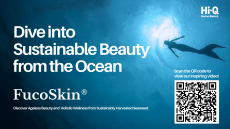Increasing omega-3 intakes linked to delayed aging: Study

Findings published in Frontiers in Nutrition indicated that there may be an optimal dose for omega-3s to delay biological aging, measured using Phenotypic Age Acceleration (PhenoAgeAccel), which is the difference between an individual’s phenotypic biological age (determined using biochemical markers) and their chronological age.
“Moreover, the study indicates that factors such as gender, age, ethnicity and hypertension may influence the relationship between omega-3 intake and PhenoAgeAccel,” wrote scientists from Beijing Sport University, China University of Geosciences, and the China Institute of Sport Science.
“For instance, males and participants aged 60 and above exhibited a stronger negative correlation with omega-3 intake, possibly reflecting differences in bioavailability, metabolic pathways or omega-3 fatty acid needs among different populations.”
Omega-3 and biological aging
This is not the first time that omega-3 intake has been linked to delayed biological aging, with a 2022 review in Nutrients reporting that the scientific literature to date “overwhelmingly” supports beneficial effects of omega‐3 fatty acids on the length of telomeres, a marker of biological aging.
Scientists from the Institute of Genetics and Animal Biotechnology of the Polish Academy of Sciences cited that the potential benefits may be linked to the ability of omega-3s to counter the detrimental effects of oxidative stress and inflammation, both of which have been linked to accelerated telomere shortening and dysfunction.
Commenting independently on the findings, Harry Rice, PhD, VP of regulatory and scientific affairs at the Global Organization for EPA and DHA Omega-3s (GOED), told NutraIngredients: “Despite relatively significant study limitations as outlined by the authors, the present results are intriguing and provide a compelling reason to design future research to determine the causality, if any, between EPA/DHA and aging.
“While we’re far from finding the elixir of life, results from the present research, combined with the promising, yet limited, body of scientific evidence demonstrating benefits of EPA/DHA for attenuating the shortening of telomeres, suggest that EPA/DHA could really have anti-aging benefits.”
Study details
The new cross-sectional study used data from 20,337 adult enrolled in the National Health and Nutrition Examination Survey (NHANES) from 1999 to 2018. Using “comprehensive phenotypic age calculation methods” and analysis of omega-3 intakes, the researchers found that an increase in omega-3 intake was associated with delayed PhenoAgeAccel.
The potential protective effects associated with omega-3 intake increased significantly up to an inflection point around 1.1 g per day, after which “the impact of omega-3 intake on accelerated phenotypic aging tends to stabilize”, the researchers wrote.
Additional analysis revealed factors such as age, gender, rac, and hypertension may also impact the relationship, suggesting that personalized guidance may be needed.
“This study provides valuable insights into the potential role of dietary omega-3 fatty acids in modulating the human aging process, holding significant theoretical and practical implications for formulating evidence-based nutritional intervention strategies to delay aging and improve life quality,” the researchers concluded.
“We look forward to subsequent research building upon this study to deepen the understanding of this field and offer more precise guidance for the health maintenance of the elderly population.”
Source: Frontiers in Nutrition
2024, Volume 11, doi: 10.3389/fnut.2024.1424156
“Dose–response relationship of dietary Omega-3 fatty acids on slowing phenotypic age acceleration: a cross-sectional study”
Authors: D. Wu et al.
























